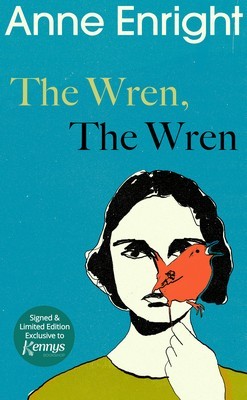This is post 5 / 6 of the Shadowing WPF 2024 series.

Sticky Labels Fixed
I loved the lyricism of this book and its focus on language and the role of poetry in relationships. It’s the story of Nell, her mother Carmel and to a lesser extent, Carmel’s father, and not really of the other peripheral men in their lives. If I weren’t reading the whole shortlist in six particularly busy weeks, I’d have reread this novel as soon as I finished it, partly because I enjoyed it but mostly because it’s complex, filled with mirroring and patterns, and I doubt I’ll do justice to it after just one reading. I wonder whether, by this stage of the competition, judges are re-reading, which will favour this text, I think.
The opening and close of the novel explore the ways in which we think - is it in images, words or something else? Enright also enquires into the distance between people’s perception, and the limits of empathy and translation. She compares the variety of degrees of interoception, our level of awareness of our own internal body, physically and emotionally, and the lack of it. Does language really clarify, or disguise; reveal or mask; does it illuminate reality, or mess it up like a ‘sticky label fixed’?
It can be disturbingly intimate, such as the the description of a man’s horror of anatomically internal noises, ‘as though the slurp and chomp of other people’s mastication happens inside his brain…a complete invasion, like torture.’ Her contrast between people whose bodies ‘are always declaring themselves and sharing their news. Oh no, itchy!’ and those that are quiet, keeping private matters internalised, isn’t something I’ve seen brought to life so well before. There are many such funny moments of Enright seeding an in-joke, or switching register and voice for a moment at a time.
The sense of intimacy is enhanced linguistically by colloquial introductions like ‘But listen’ or ‘So’ and conclusions like ‘But there you go’, making it easy to imagine a Dubliner’s voice similar to that of Enright. Her characters’ questions and offers are often statements, ‘You’ll come back for something,’ says Felim’s ma, and ‘You’re the daughter.’ The poetry links her to rural Ireland, such as to Felim’s ma, who recites a poem to her, but the lack of authenticity, Felim’s rejection of his homeland in favour of the American wife, the fact that much of his fame rests on rewrites of ancient texts and that horrible Felim’s family embrace it helps us to question the romanticised ruralism and romance of the poetry.
The pretensions of Nell and her University friends, thinking ‘real paper meant they were real poems’ and that ‘an apple green moleskine might look good on insta’ are skewered playfully. Enright includes the best first presentation I’ve seen of doomscrolling, such as compulsively seeking out videos of animal reunions and cochlear implants to feel ‘the prick of tears’. Her frame by frame tracking of response, ‘Boy looks up / Tear initiation / Something happens in his face /Tear confirmation’ is an excoriating takedown of the contrived emotional manipulation that clogs the internet, and our consumption of it.
The mother Carmel, a dismissive, literalist pragmatist, doesn’t suffer fools. Nell tells her nothing in case she goes and beats someone up - a careful, abiding mother, a crusader. It’s a puzzle, this relationship, because while Nell finds her dreadfully boring, the relationship clearly does sustain her, as we see them hug and eat together, cherish one another tenderly.
She’s psychologically spot on about Nell’s relationship with strong farmer’s son, Felim. ‘Waiting for this man was better than being with him…the way longing kept eating itself and giving birth to more longing, And nothing, but nothing, was better than that first flash of arrival.’ It’s hard to watch her putting herself through it, as well as writing inauthentic posts for a living, and we hope she’ll come back to herself.
I enjoyed the kaleidoscopic, multifaceted nature of the text: alternating first and third person narratives of mother and daughter, interrupted frequently by invented travel writing, Phil’s poetry, letters and a chapter by Phil himself. This mosaic approach reinforces the emotional naturalism of the story somehow.
I have two reservations. Firstly, this may be as shallow as choosing a notebook for how it looks on insta, but is it only me who struggles to find the name Phil poetic? Secondly, does anyone else find the bird references and noises, if not irritating, then a little laboured? I found the onomatopoeic ‘Chiddik. Chiddik’ and so on distracting. I should have been more trusting, because by the very end, this feeds into the novel’s structure, but until then, it grated.
From the point of view of prizes, the fact that the novel explores language, communication, poetry and translation, subjects likely to engage any literary judge probably, won’t hurt. In terms of ambition, ventriloquistic skill with voices and experimentation, this is also a potential winner. I can’t agree with Brunch Book Club’s Sabine that Enright has ‘an almost after-thought plot’, since the layered, developing references to travel and art across the generations seem to me more successful than that. However, I’m not sure it has the direct emotional clout of some of the other texts on the shortlist, like Brotherless Night, or Soldier Sailor, which may mean it’s pipped to the post.